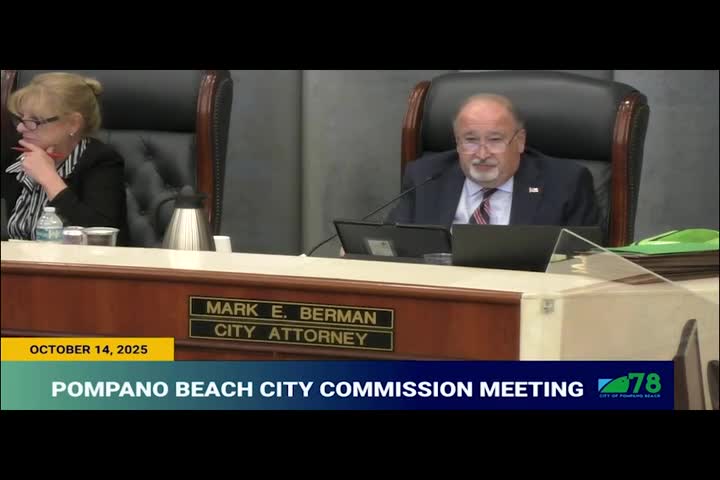Pompano commission rejects censure of Commissioner Audrey Fesick after heated debate and public comment
Get AI-powered insights, summaries, and transcripts
Subscribe
Summary
The commission considered a resolution accusing Commissioner Audrey Fesick of disparaging city employees on private social media. After extensive debate and public input — including lawyers and county officials — the motion failed on a split roll call.
The Pompano Beach City Commission on Oct. 14 considered a formal resolution that would have publicly reprimanded Commissioner Audrey Fesick for social-media posts the mayor and other commissioners said singled out and disparaged city employees. After nearly three hours of discussion, public testimony and attorney statements, the motion to adopt the censure failed on a 3–3 recorded vote.
Why it mattered Mayor Rex Harden said the resolution was intended to protect city employees who reported feeling threatened and targeted after being named in social-media posts and videos. Harden framed censure as a formal, non-punitive statement of the commission’s disapproval of conduct it deemed inconsistent with the charter instruction that “members of the city commission shall deal with city employees solely through the city manager.” He told the dais: “Our employees…they've got nowhere to go…they were being singled out in posts on social media concerning supposed corruption.” (Transcript: 11640–11655)
What commissioners and public said - Mayor Rex Harden opened the discussion and presented the censure resolution, citing public records and social-media posts that named employees. Harden described staff concerns about safety and reputational harm and said staff and human resources had limited options to remedy the situation. (Transcript: 11343–11639) - Commissioner Audrey Fesick, who was the subject of the resolution, and her counsel argued the posts were protected private speech and that the resolution constituted an overreach; her attorney warned of constitutional and defamation risks if the commission tried to suppress private speech. Attorney Michael Pizzi told the commission: “They have an absolute right to express their First Amendment opinion on social media in their private accounts.” (Transcript: 12529–12572) - Several members of the public spoke in defense of Commissioner Fesick, calling the resolution an attempt to silence scrutiny and warning of overreach. Others, including commissioners and community members, said employees had experienced fear and reputational harm. Broward County Commissioner Lamar Fisher told the commission his family had been threatened previously, and urged that the city not subject family members to risk when posts identify private individuals. (Transcript: 13631–13861)
Final vote and outcome After debate and public comment, the resolution to censure Fesick went to a roll-call vote. The final votes were recorded as: Commissioner Sigerson Eaton — yes; Commissioner Smith — yes (stated support in relation to employee concerns); Commissioner Audrey Fesick — no; Commissioner Perkins — no; Vice Mayor Fournier — no; Mayor Harden — yes. The tally (3 yes, 3 no) failed to meet a majority, so no censure was adopted. (Transcript: 15790–15802)
Discussion vs. formal action Commissioners framed the issue as a tension between two legal and ethical principles: (1) elected officials’ First Amendment right to private speech on social media; and (2) the city charter’s direction that commissioners communicate with employees through the city manager, together with employer obligations to prevent hostile work environments. City Attorney Mark E. Berman had earlier advised commissioners that social-media posts concerning city business are public records and may create employer liability if they foreseeably affect an employee’s working conditions (citing sections of Florida law and prior opinions). (Transcript: 12142–12198)
Next steps No formal disciplinary action was taken. The discussion produced public-recorded testimony and requests that staff review procedures for employee protection and further clarify public-record obligations for commissioners. The commission did not direct a formal investigation tied to the failed resolution, though several commissioners said they wanted to address employee concerns and the mayor asked for steps to prevent harms to staff reputations.
Provenance (evidence spans) - Resolution introduction and opening remarks by Mayor Harden: transcript excerpt beginning ~11343 where agenda item is introduced and rationale explained. (block_id: "t:11343.695") - Berman legal guidance on social media and public records: excerpt beginning ~12142 ("per section 119.011 Florida statutes...constitutes a public record"). (block_id: "t:12142.09") - Public testimony and attorney statement for Commissioner Fesick: excerpt beginning ~12529 where Michael Pizzi, attorney for Commissioner Fesick, addresses First Amendment concerns. (block_id: "t:12529.005") - Final roll-call and disposition: transcript roll-call and statement that matter failed at ~15790. (block_id: "t:15790.635")
Speakers (attributed quotes in article) - Rex Harden, Mayor (City of Pompano Beach) — introduced the resolution and: “Our employees…they've got nowhere to go…they were being singled out in posts on social media concerning supposed corruption.” (Transcript: 11640–11655) - Mark E. Berman, City Attorney — advised that political posts about city business are public records and may be subject to retention and that commissioner communications with staff should flow through the city manager. (Transcript: 12142–12198) - Michael Pizzi, Attorney for Commissioner Audrey Fesick — during public comment: “They have an absolute right to express their First Amendment opinion on social media in their private accounts.” (Transcript: 12529–12572) - Lamar Fisher, Broward County Commissioner and resident — told the commission he and his family have been the target of threats and urged caution about public posts naming people. (Transcript: 13631–13684)
Salience and context The item drew the meeting’s largest audience and most extended debate. It also generated the strongest division among commissioners, reflecting broader civic tensions about social-media use by officials and the protection of municipal staff. Because the resolution failed, the commission left existing grievance and HR channels intact while flagging the need for better staff protections and clearer guidance to elected officials.
